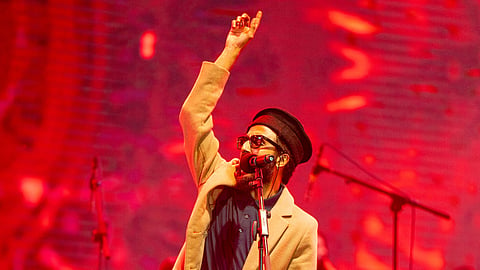Murshidabadi Project on pursuing Sufi music
Founded in 2014, the Murshidabadi Project, by Soumya Murshidabadi, has earned renown as an authentic Sufi ensemble and a collaborator in various art forms, genres, and soundscapes, both within India and internationally. Committed to the teachings of the mystics, the outfit strives to bring the “sound of the soil” back to its roots, establishing itself as a truly unique and niche entity in the musical landscape. As they are all set to perform at AMI Arts Festival, we speak with Soumya about the art form and why he feels inclined towards Sufism.
What are you performing at AMI Arts Festival?
We are preparing a set called Saat Maqam Ishq Ke, or seven stages of love, which is a musical dastan narrating the journey of Sufi love/ego in seven stages— from “attraction” to the “annihilation of ego”. We are joined by Naynesh Pimpale on tabla, Swetketu Banerjee on sitar and Monojit Saha on the keys. It’s a unique set where the poetry of Amir Khusro, Kabir, and Mansur Al Hallaj will hold each other’s hand to explore the seven stagesof love.
How has the journey been for the Murshidabadi Project?
Our first paid assignment was to write music for a play called Oka Boka Tiloka at the prestigious Prithvi theatre, Juhu in 2014. It’s been pretty interesting after that. We love to collaborate. When Coca-Cola approached us, we knew exactly what we wanted to represent. The same goes for scoring Moko Kahan for Srijit Mukherji’s Sherdil on Netflix. We try to keep the authenticity intact.
What drew you to Sufi music?
In this turbulent time, Sufism is one such philosophy that talks about the inner growth, putting love in the epicentre, finding the inner callings and one that inspires a quest. The mystic poetry of Khusro and Mansur that I usually present in my repertoire, helped me find solace. Therefore, I sing Sufi poems against violence and divisive policies that separate human beings from each other.
What’s the approach of the audiences towards Sufi music?
Sufism is an age-old philosophy of this subcontinent and its roots lie in its very heart. We have received admiration from all over the world. Interestingly, we never performed in Kolkata with our original set of Murshidabadi Project since its inception.
How do you blend other music genres with Sufi?
I follow the traditional raga-ang gayaki where the emphasis is to follow one primary raga as the mode of one composition and many genres blend around it. It’s an organic process of music making, where we are not trying to create but build it together. The blending is never forced.
What is your idea of experimental music?
Experimental music is when you broaden your musical vocabulary. You can then try to weave something unique and contextual. Without context, it doesn’t make any sense to me.
Why do you think these interdisciplinary art festivals play an important role in today’s time?
Festivals like the AMI Arts Festival creates a unique opportunity to witness many disciplines of art under one roof and helps the audience appreciate the art better. I have been an avid follower of Shujat Khan Sahab and Sajan Mishra ji who are also being featured, which is a great honour for me.
What are your upcoming performances/projects?
New songs are coming, and our listeners will get a massive surprise. We have been working on it for a long time. We recorded something for Q for his movie Zewel, which I’m pretty excited about.
The Murshidabadi Project is performing at the AMI Arts Festival on December 22, 5 pm at Kolkata Centre for Creativity Amphitheatre.

